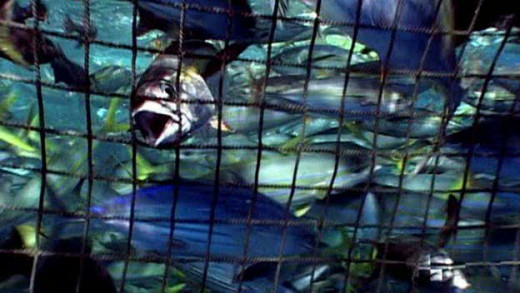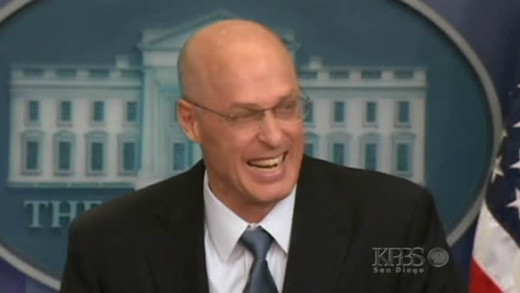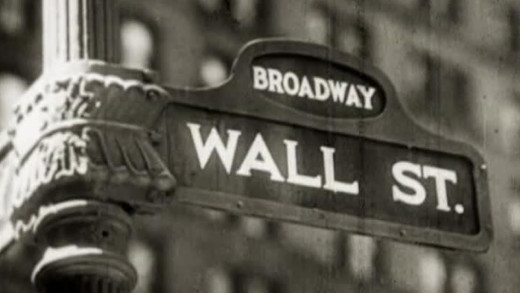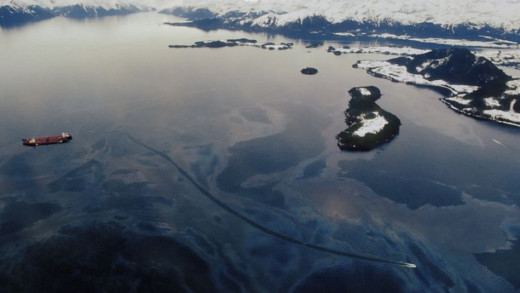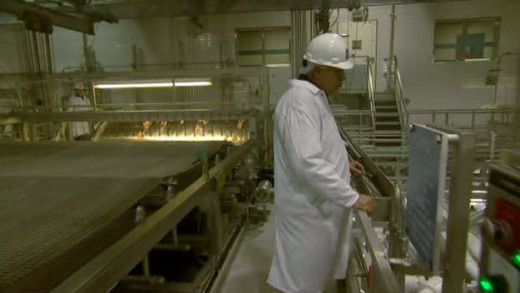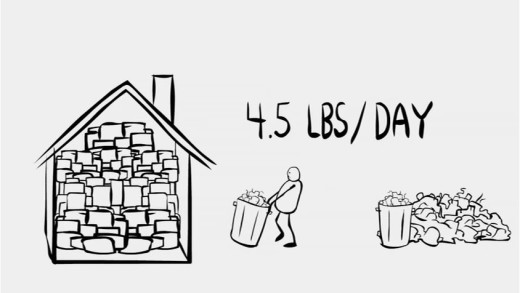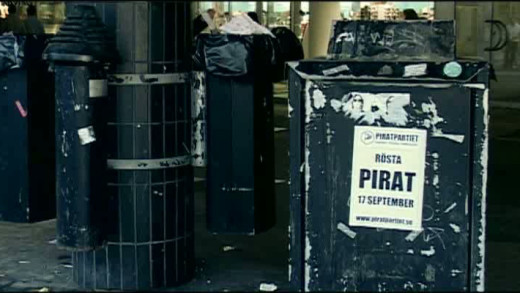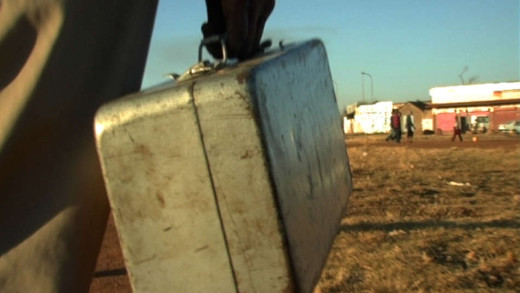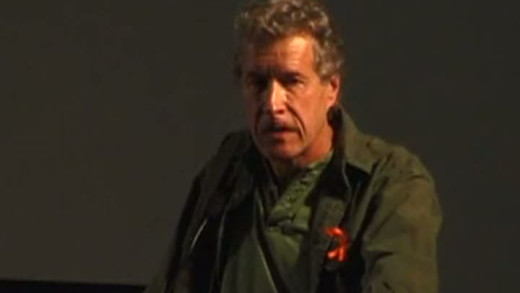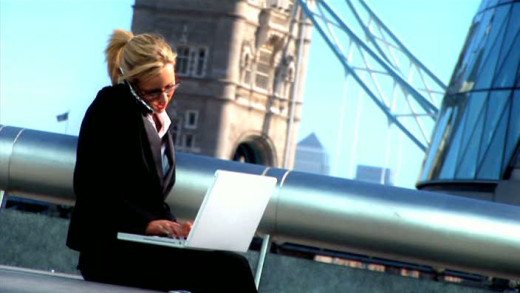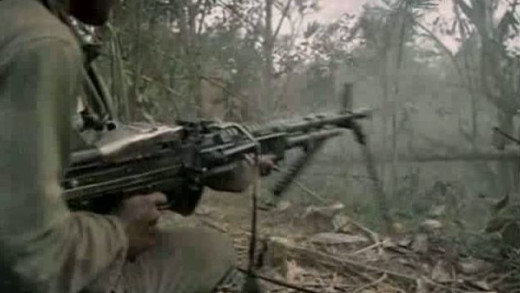Barbie, H&M jeans, everyday corn--just some of the products recalled due to controls on the use of dangerous chemicals as a wave of legal cases over toxicity is calling manufacturing of certain products into question. The Toxins Return follows the trail from field worker, to customs, to the high street shopper--how much can we trust all these products?
Sweet Crude
Sweet Crude is the story of how large oil corporations such as Shell and Chevron have absolutely decimated the Niger Delta, but the people are fighting back. The film shows the human and environmental consequences of 50 years of oil extraction against an insurgency of people who, in the three years after the filmmakers met them as college students, became the young of the Movement for the Emancipation of the Niger Delta (MEND). The movement is born after series of non-violent protests, and what the corporations and colonisers don't understand is that these people will fight for their land and emancipation until the end. Sweet Crude is their story of survival and armed resistance against corrupt governments and rapacious corporate power, amongst a complicit and collusive mainstream media.
Advances in technology, global demand and the very essence of the commercial fishing industry itself means that whole species of wild fish are under threat. The species of fish that we eat today are predicted to be in a state of collapse by 2050 -- some are already extinct. Overfishing, or even more simply, the commercial fishing industry in general is to blame for this, along with celebrity chefs and 'exotic' restaurants; and mass consumer demand in today's world of globalisation. The End Of The Line documents the concerns and the processes behind commercial fishing and it's impact on the environment, the climate and the future existence of many species -- including our own...
In September 2008 when the American economy was on the verge of melting down, the then-Secretary of the Treasury Henry Paulson, his former protégé John Thain (CEO of Merrill Lynch), and Ken Lewis (CEO, President, and Chairman of the Bank of America) secretly cut a deal to merge Bank of America and Merrill Lynch -- in the midst of stock collapse; a rocky merger; the worst fourth-quarter losses in at least 17 years; a stockholder revolt and an urgent need to raise more capital despite a $45 billion "bail-out" from the federal government...
Across the globe, this culture is polluting, diverting, pumping and wasting fresh water at a crazy rate, as population grows and technology escalates. The rampant expansion of agriculture, housing and industry increase the demands for fresh water well beyond the limited supply, resulting in the desertification of the Earth. Corporate giants force developing countries to privatise their water supply for profit, Wall Street investors target desalination and mass bulk-water export schemes, while governments use water for economic and political gain. Military control of water emerges and a new geo-political map and power structure forms, setting the stage for global conflict over fresh water. Blue Gold follows numerous worldwide examples of people fighting for their basic right to water, from court cases to United Nations conventions, to revised constitutions, to local protests at grade schools, to complete revolutions. A line is crossed when water is a commodity. Will you fight to stop it and protect it?
Bananas!*
Bananas!* documents the legal battle of banana plantation workers in Nicaragua against the Dole Food Company over cases of sterility caused by the pesticide DBCP. The chemical, despite being banned, was knowingly sprayed on crops and workers. The result is the same old battle with corporate power as the film unpacks the issues of the case and the lives of the workers through the local lawyer Juan Dominguez. Dominguez bridges the gap between the rapacious North American company and the South American workers who were not told about or protected from the pesticide, to make a claim against one of the largest corporations in the world for justice for its workers.
The Gruen Effect is a biographical film of Victor Gruen, considered by some to be the grand architect of the modern shopping mall and pedestrian zone. His ideas about urban planning have led to cities that serve the new gods of consumption, developing concepts that have reshaped the modern world. But in perhaps the ultimate of ironies, a naïve Gruen initially envisioned shopping centres as utopian communal spaces that would bring people together. However, developers took these ideas to brood the emergence of suburbia and the new era of consumption that would come to define the post-war world. Viewed with a critical eye, and tracing the path from Gruen's prewar Vienna, to the 1950s America, and back to Europe in 1968, The Gruen Effect can show the themes and translation errors that have come to define intensely colonising urban life, along with a disappointed Gruen appalled at the impact shopping centres have on communities.
Crude
As one of the largest and most controversial legal cases on the planet, Crude takes a look inside the $27 billion "Amazon Chernobyl" case, viewing the real-life high stakes legal drama set against a backdrop of the environmental movement, globalisation, hackneyed celebrity 'activism', human rights, multinational corporate power and rapidly-disappearing indigenous cultures...
Coca Cola is one of the most visible brands in the world, but there's one part of the operations the corporation doesn't want you to see. Colombia is the trade-union-murder-capital of the world. Since 2002, more than 470 workers' leaders have been brutally killed, usually by paramilitaries hired by private companies intent on crushing the unions. Amongst the top unscrupulous corporate brands is Coca Cola...
Over six desperate days in October 1929, the New York Stock Exchange crashed leading to the collapse of three thousand banks, taking people's savings with them. In a matter of days, the United States economy was obliterated. The crash was followed by a devastating worldwide depression that lasted until the Second World War. Finances did not regain their pre-crash values until 1954. This film recounts the story of a financial disaster that we hoped could never happen again, revealing the familiar tune of cheap credit, consumerism, greed, corruption and cronyism in the current-day financial crisis...
Corporations On Trial is a five-part series following just some of the many lawsuits being brought against multinational corporations for war crimes, conspiracy, corruption, assassinations, environmental devastation and payments to terrorists. Such serious charges have forced some of the world's largest companies to hire high-profile defence lawyers to protect public relations in cases often brought by plaintiffs who are barely literate. These five films reveal a growing anxiety about the power and influence of big business, as many multinational corporations have annual revenues greater than some countries' national budgets and indeed increasingly hold governments to ransom by their economic power. Around the world, ordinary people are fighting back and asking how many more times their interests should be sacrificed for corporate greed and shareholder profit...
The Medicated Child confronts psychiatrists, researchers and government regulators about the risks, benefits and many questions surrounding psychotropic drugs for children. The biggest current controversy surrounds the diagnosis of bipolar disorder. Formerly called manic depression, bipolar disorder was long believed to only 'apply to adults', but in the mid-1990s 'bipolar disorder in children' began to be diagnosed at much higher rates, sometimes in children as young as 4 years old...
"Supermarkets have bulked up. These days they’re retail superpowers who make money not just when we eat or drink but increasingly when we fill the petrol tank, play pokies or buy a hammer from the local hardware – and they’re quietly stalking pharmacies, newsagents and florists. Coles and Woolworth’s sell 70 percent of the dry groceries and half the fresh food that Australians consume – among the highest concentrations of market power in the developed world"...
In the early hours of March 24th 1989, the Exxon Valdez oil supertanker runs aground in Alaska. The ship discharges several tens of millions of gallons of crude oil. The incident becomes the biggest environmental assault in North American history, and in a flash, the news shoots across the planet along with footage of thousands of dead seabirds, sea otters and other marine life covered in oil, devastated. Thick black tides rise and cover the beaches of the once-pristine reefs of Alaska. Black Wave recalls this event, a generation later, by speaking with renowned marine toxicologist Riki Ott and the fishermen of the little town of Cordova, Alaska. They tell us all about the environmental and social consequences of the black wave that changed their lives forever—the legacy of the Exxon Valdez that still lingers today.
By examining the practices of a relentless multi-billion dollar marketing machine that now sells kids and their parents everything from junk food and violent video games to bogus educational products and the family car, Consuming Kids presents the explosive growth of child marketing in the wake of deregulation, showing how youth marketers have used the latest advances in psychology, anthropology and neuroscience to transform children into one of the most powerful and profitable consumer 'demographics' in the world...
Food, Inc.
What does the corporate-controlled food industry look like? Film-maker Robert Kenner lifts the veil on today's food industry, exposing the underbelly that has been hidden from view of the consumer with the cooperation of government regulatory agencies such as the USDA and FDA. The food supply is now controlled by a handful of corporations that put profit ahead of consumer health, the livelihood of the farmer, the safety of workers and of course, the environment. We have bigger-breasted chickens, the perfect pork chop, herbicide-resistant soybean seeds, even tomatoes that won't go bad. But we also have new strains of E. coli—the harmful bacteria that causes illness for an estimated 73,000 Americans annually; are riddled with widespread obesity, particularly among children; and an epidemic level of diabetes among adults. And the whole mess is exacerbated by opportunistic politics—the tools of Big Agriculture running the very regulatory agencies that are supposed to protect the public—and consumers who have become accustomed to eating whatever they want whenever they want, in quantities they don't need...
The Niger Delta is still an environmental disaster after more than fifty years of oil exploitation. One and a half million tons of crude oil has been spilled into the creeks, farms and forests so far. Natural gas contained in the crude oil is burnt off in gas flares which spread toxins, acid rain and destroy crops. Poison Fire documents the life of the locals in impoverished communities, creeks full of crude oil, devastated mangrove forests, wellheads leaking gas, all working to fight against oil giant Shell to at least stop the toxic gas flares...
The Garden
The Garden tells the story of South Central Farm -- a 14 acre community garden and urban farm located in Los Angeles, California, which was in operation between 1994 and 2006. The entire lot is evicted and demolished against overwhelming local support for the farm and also despite the community raising an incredible amount of money to purchase the land from the owner. The owner refuses to sell and the land is demolished and still sits vacant, unused...
Flow—For The Love Of Water builds a case against the growing privatisation of the world's dwindling fresh water supply with a specific focus on human rights, pollution, the politic of corporate influence in the emergence of a domineering global water cartel. The film names and clearly documents many of the culprits, while asking the question—can anyone really 'own' water?
From its extraction through sale, use and disposal, all the stuff in our lives affects communities at home and abroad, yet most of this is hidden from view. This is by design. The Story of Stuff serves as an introduction to the underside of the current world of mass production and consumption, exposing the connections between a huge number of environmental and social issues -- shedding the light on the hidden processes behind our modern world. How can we create a more sustainable and just economy?
Robert Beckford visits Ghana to investigate the hidden costs of rice, chocolate and gold and why, 50 years after independence, a country so rich in 'natural resources' is one of the poorest in the world. He discovers child labourers farming cocoa instead of attending school and asks if the activities of multinationals, the World Bank and International Monetary Fund have actually made the country’s problems worse...
Good Copy Bad Copy is a documentary about the current state of copyright and culture in the context of Internet, peer-to-peer file sharing and other technological advances. Featuring interviews with many people with various perspectives on copyright, including copyright lawyers, producers and artists, Good Copy Bad Copy documents that "creativity itself is on the line" and that a balance needs to be struck, or that there is a conflict, between protecting the right of those who own intellectual property and the rights of future generations to create...
The Big Sellout reveals the reality of privatisation and globalisation by examining the corporate takeover of basic public services throughout the world, such as water supply, electricity, public transportation, and public health care. In South America, Asia, Africa, but also in Europe and the United States, filmmaker Florian Opitz talks to the architects of the new economic world order, as well as to ordinary people who have to deal with the real direct effects. The result is a tapestry of narratives the world over that show where the dogma of privatisation cames from, who profits from it, what societies lose, and why resistance is so important.
Confessions of an Economic Hit Man is a presentation by John Perkins, based on the book by the same name published by him in 2004. Perkins describes the role: "Economic hit men are highly-paid professionals who cheat countries around the globe out of trillions of dollars. They funnel money from the World Bank, the US Agency for International Development (USAID), and other foreign "aid" organisations into the coffers of huge corporations and the pockets of a few wealthy families who control the planet's natural resources. Their tools included fraudulent financial reports, rigged elections, pay-offs, extortion, sex, and murder. They play a game as old as empire, but one that has taken on new and terrifying dimensions during this time of globalisation."
The Trap
If one steps back and looks at what freedom actually means in the West today, it's a strange and limited kind of freedom. The United States and its empire self-describe fighting the Cold War for "individual freedom," yet it is still something that the leaders of our so-called democracies continually promise to give us. Abroad, in Iraq and Afghanistan, the attempt to force "freedom" on to other people has led to more than just bloody mayhem, and this, in turn, has helped inspire terrorist attacks in Britain and elsewhere. In response, the government has dismantled long-standing laws that were designed to protect individual freedom and civil liberties.
King Corn follows two college friends curious about the food system, as they decide to have a shot at farming an acre of corn. In the process, the two examine the role that the increasing production of corn has had across not only on the concepts of industrial food, but the health of the land, the health of the environment, and the health of people. The film spotlights the role of government subsidies which make huge monocrops of corn possible, which itself has—as industrial agriculture—a catastrophic ecological impact, but in-turn drives factory-farming of animals and other atrocities such as the production of high-fructose corn syrup which is saturated throughout industrial food, not least, fast-food. We see how this industrialisation has eliminated the family farm and local food production—things which are increasingly impossible in this brutal arrangement of corporate power.
Steal This Film
Presenting accounts from prominent players such as The Pirate Bay, Piratbyrn, and the Pirate Party in the Swedish piracy culture, Steal This Film documents the movement against intellectual property. In particular, the film provides critical analysis of the alleged regulatory capture attempt performed by the Hollywood film lobby to leverage economic sanctions by the United States government on Sweden through the WTO...
We
We is a visual essay exploring the politics of empire, war, corporate globalisation, imperialism and history; using the words of Indian author and political activist Arundhati Roy, from her speech Come September given in Santa Fe, New Mexico one year after the September 11th attacks--not long after the invasion of Afghanistan. The result is a mix of archive footage illustrating specific historical events throughout South America, the Middle East and elsewhere, in context with the September 11th attacks; placed alongside the themes of empire, global economics and a short history of neo-collonialism...


